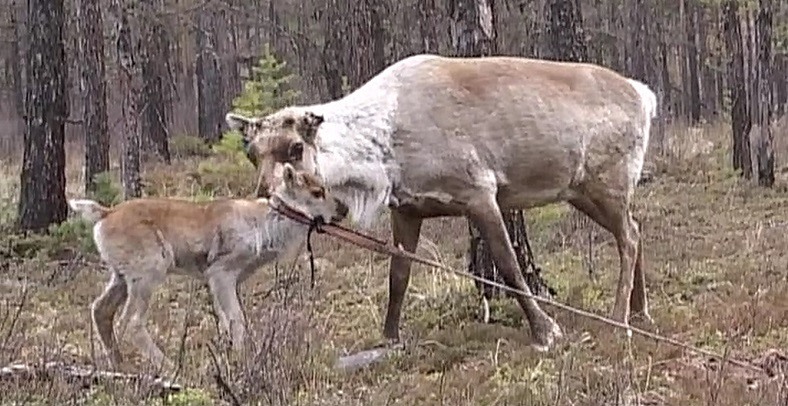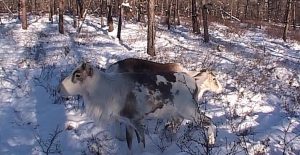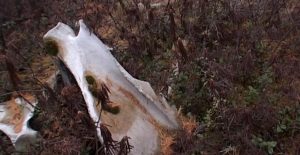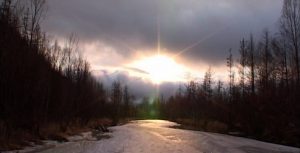Last Updated on April 12, 2020
Liuxia will grow old day by day in the yearning and love for her son, and little Yuguo will grow up day by day under the nourishment of science and culture. They never know each other, but they have to become more and more like strangers. The wheel of history rolled over the mother and son, bearing the pain and sorrow we can’t imagine.
Qi Yi Guo Jiang Cu Cha
Endorsement
Short Comments
This is my favorite of Gu Tao’s works. There are laughter and tears. It is very real is really happening between people.
-Zhang Qi
Learn more about this film from the director’s point of view by reading Gu Tao interview.
The lens expresses the mother and son’s affection, as well as the decline and inheritance of ethnic culture exquisitely and profoundly. It is a thought-provoking and very good documentary!
-Qiao Jia Qi
I cry and laugh when seeing it. It’s a good documentary. It’s a beautiful drama film, too.
-Xia Yi Ke
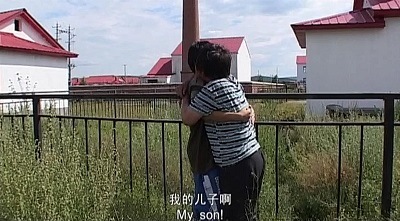
Direct records, concise editing, sincere emotions, and the domestication of the Evenki.
-Gu Su Shang Kang
The documentary itself has a solid image technique. As for the record itself, this contradiction between urbanization and rural itself is reflected in a child, which makes me sigh with emotion. Of course, the director is clever to add the mother – son affection of the secondary line and makes it more touching.
-Xiao Yu
I haven’t seen documentary for a long time, and I was moved by it. The emotions of people really living on the land can always express more than those rational words. I’m just another little Yuguo.
-Ying Ning
I was moved from the beginning to the end.
-Fei Niu Yao Fen Dou
Very good anthropology documentary.
-Yang Le Yin
I watched it for 20 minutes and cried my eyes out.
-Da Meng@Loss
Vivid, interesting and touching.
-Andre
The first five minutes brought tears to my eyes.
-La Ji Dai Xiao Jie
This is the kind of unspeakable missing a mother has for her son.
-Luo Shan Yi Hou
The presentation of human nature and maternal love.
-PBgou
Strongly recommended. It makes you think a lot.
-Li Da Ren
Source: Douban
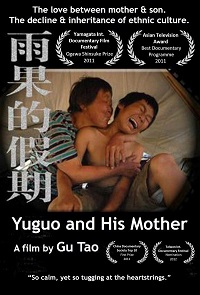
Yuguo and His Mother is the second documentary of Gu Tao’s Evenki trilogy. Read endorsement and issues review of the first film Aoluguya, Aoluguya.
Narrative: The Individual Reveals the Ethnic Destiny
The film records the reunion of the Evenki teenager who leave the mountain and can’t go back even if he wants to and the last generation of Evenki hunters who stick to the primitive life. In addition, it records the loss of an ethnic minority family in the process of modernization and the vanishing of the ethnic culture to arouse thoughts and tastes.
The director cares for the development of Evenki out of a kind of spontaneous cultural consciousness and thinking spirit. He hopes to present the conflict between ancient and modern civilization through his own deep feeling. This embodies the documentary creators’ sense of responsibility of the times.
Scene: Simple Is the Truth
Throughout the documentary “Yuguo and His Mother”, director Gu mostly uses mid – and panoramic shots to record. And the narrative is mostly shot in one take with the characters in the environment of forest. In the fixed shot, things are quietly happening.
Viewers get to know the characters from an outsider’s perspective, but they also get to see them as personally on the scene. Getting used to facing video cameras, Liuxia and Weijia can express themselves without concerns and even sing to voice their feelings. This is more convenient for the audience to get close to the inner world of the characters to feel the moment in the documentary.
Conclusion
This documentary, while recording the living conditions of ethnic minorities, also makes some reflections on their lifestyle and the evolution of ethnic culture. It is through the care of ethnic minorities that this kind of documentary has the touching power and artistic vitality. Therefore, this kind of documentary has been widely recognized.
The problem of the “being disappeared” of human civilization is universal. This film provides a referential direction for the development of anthropological documentary.
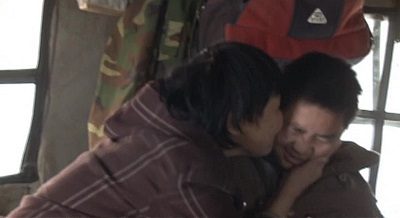
Issues Review
We translate the local audiences’ reviews about issues presented in the film into English when possible. In this way, you can take a look at what local people think about these issues and have in-depth understanding about them.
Warning: spoilers may apply. To ensure the best viewing experience, we suggest that you watch Yuguo and His Mother first and subscribe now for 20% OFF.
Short Comments
Yuguo would become the painful pendulum in the future. He can’t fully integrate into the modern society, and can never return to the forest, either.
-Rong An
The age of the Evenki hunters has come to an end in the uncle’s generation. The Evenki kid who grew up in the city is already not able to pull a tree trunk. New houses designed for the Evenki settlement have become so-called tourist attractions.
-Festa
It is regret to see they begin to forget things from ancestors just like the Han youth of us. Although Yuguo has the base of the Evenki, in his shy smile he is gradually going away.
-Strelizeia
It is a pity to see Yuguo as a generation which turned away from the forest and unable to integrate into the city.
-mOco
A mother living in the mountains misses her son who was taken to live in the city. That kind of sincere feeling lets people feel that this is almost an ethnic group’s missing to themselves.
-Lao Wei Er
Two things are deeply touching. One is a mother’s love. Second, Yuguo’s uncle says he feels that the child doesn’t belong to the forest. Hugo’s uncle says he can survive in the forest with a hunting knife. But now it is not about survival, it is that we are thinking about how to live.
-Zhi Xi De Feng
Don’t judge others by your own values. Don’t feel any sympathy for the northern minorities. Please look and listen carefully. Please fucking distinguish between Evenki and Oroqen.
-Agent Q
Civilized society makes people cautious.
-Sheng Sheng
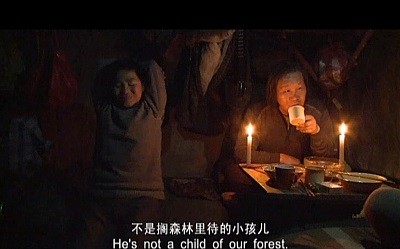
How to let the next generation which just see the world understand snow forest’s wild and lonely?
-Yao Qi
Time and family love rival each other. Affections and embarrassment coexist. The songs, dances, and poems of the ethnic minorities, the feeling of original ecology, and the Evenki culture are disappearing step by step.
-Ya Tou
Children are growing up, adults are aging, and culture is disappearing. See who’s faster.
-Sun Shy
Forest elves who are replaced by industrialization and urbanization and hunters whose knives and guns are confiscated have nothing to do. The people who connect the preceding and the following generations have gone. They can only drink the inferior alcohol and escape kindheartedly in the snow country where the logging machine rumbles.
-Sui Sui Nian De Xiao Xiao Hao
A generation is witnessing the disappearance of hunting culture and the extinction of hunting life.
-Zu Meng Wu Shuang
The hunting ethnic group without its gun can only recalls its past with wine.
-Wu Mou
Growing up in Wuxi, Yuguo gradually broke away from some of their ethnic traditions and habits. Seeing all this, I can’t help feeling sad and helpless. With the development of society, is the loss of all this doomed to be inevitable?
-TonyWang
The new generation of Evenki has alienated the forest. The forest culture of an ethnic group is doomed to an end.
-Chou Si Ben Tu Zi
Some things are getting away from us, and never come back.
-Rachel zhao
The Evenki are like poets, reciting beautiful poems for the moon. They are dancers, singing and dancing freely when they are happy. The Evenki are mysterious, and Shaman is their god and religion. The Evenki love to drink, and they love freedom. They are drunk but free.
-Ba Li Mei You Hai
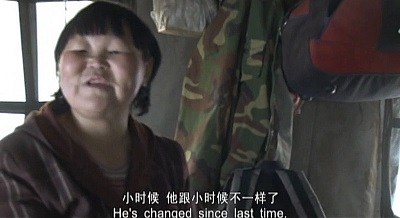
The director still analyzes the conflict and impact of the modernity of the mainstream society on the whole relatively primitive ethnicity.
-frederiick
The film itself is a little rough, but it is enough to show the rough and simple culture and feelings of the Greater Hinggan mountains. It is the infancy of civilization, and I am sincerely moved by any of their actions. Yuguo’s mother is drunk and uncivilized. However, what is civilization? Don’t drink and then you will become civilized?
-Ji Bai
Child in the city still wants to integrate with the Evenki in the Greater Hinggan mountains, but estrangement and discomfort have emerged.
-Qing Kuang Nan Yu Wan Qiu Feng
A lost Evenki youth in the cultural tide of the times. An ethnic group whose culture gradually disappeared in the background of the times. Young Yuguo’s helpless and the difference and incompatibility between the old and young Evenki. This is an epitome of all ethnic groups under the times. In the current cultural tide, many ethnic groups are in the same situation as Evenki. Young ethnic children in this flood gradually can’t find the way home and their own ethnic beliefs.
-Lin Xian Sheng Ni Hao
As a child growing up in an ethnic minority area, I felt a kinship with the life recorded there. I also resonate with the sadness flowing in the bone and blood beyond the blue sky, white cloud, and grassland of the northern ethnic groups expressed by the director. The gradual disappearance of people and culture let me sigh. Ethnic phenomena are not innate and will not last forever.
-mazzy
Source: Douban
The Evenki people are kind, simple and powerless facing of the new society, and they guard their ethnic culture with difficulty. Does culture have to swallow or be swallowed? Every culture needs soil. Why can’t mainstream culture be more tolerant?
–Bai Lu Yuan
The Pain and Sorrow of the Mother and Son
Little Yuguo represents a new generation of Evenki. They have grown up in a modern society with a highly developed material civilization and have become incompatible with the hunting culture in the forest. It is the saddest of all that the clash of cultures has created a gulf between mother and son that can’t be bridged.
Liuxia is not a qualified mother, but no one can deny her deep love for little Yuguo. The distance between her and her son is not only 3,000 kilometers from the greater Hinggan Mountains to Wuxi, but more about the cultural differences between the two worlds. Mother and son are connected by flesh and blood. They should be the closest person for each other, but the alienation between Liuxia and little Yuguo can’t even be prevented by blood.
Liuxia will grow old day by day in the yearning and love for her son, and little Yuguo will grow up day by day under the nourishment of science and culture. They never know each other, but they have to become more and more like strangers. The wheel of history rolled over the mother and son, bearing the pain and sorrow we can’t imagine.
The Plight of the Evenki
This film takes Yuguo’s holiday life of visiting families back to his hometown as the starting point. It then reveals the helpless of Evenki for the disappearing hunting civilization and the loss of real life brought by it.
Yuguo is swinging between the city and the forest. It is difficult for him to fully integrate into or give up any one of the identities. The split and collision between the two identities is the dilemma this ethnic group is facing.
The development of society makes Evenki have nowhere to escape. Like Weijia, Liuxia, and He Xie, they are spiritually desperate and their souls are wandering without a destination. This is the portray of marginal ethnic groups in the modern world. In the game with the so-called modern civilization, the Evenki people lose ground, but they are not willing to give up the ancient way of life.
See what other people say about the Evenki after watching Gu Tao’s works.
What Is Civilization?
The image of a drunken madwoman disturbing public order at a railway station is not uncommon. However, the director presents the lack of discourse right of Evenki people in the national context, which makes us really approach a mother who drinks and fights and loses her son’s custody right. This is not an individual independent existence. She has the group and the national attributes, and even represents the whole country attribute characteristic. What is civilization? It’s not a rigid set of rules, not a false etiquette, nor a flat, two-dimensional world. It’s the tolerance of diversity, the equality of rights, and the ideological differences which don’t have to seek common ground.
–Kong Di
Yuguo and His Mother is the second documentary of Gu Tao’s Evenki trilogy. Read issues review of the last film The Last Moose of Aoluguya.

